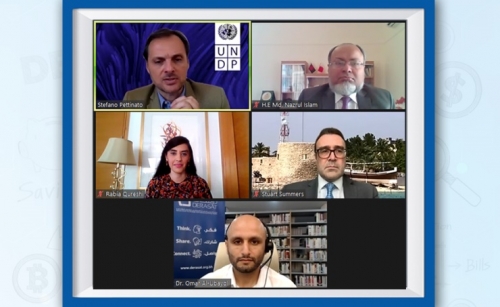Impact of pandemic in Bahrain ‘under control’
TDT | Manama
Representatives of expatriate communities have hailed Bahrain’s sustained efforts to cushion the socio-economic impact of the coronavirus (COVID-19) pandemic. Following surveys conducted to assess the impact of COVID-19, the Kingdom’s preemptive and precautionary measures have effectively contained and mitigated the pandemic, they noted.
A joint report prepared by the Bahrain Center for Strategic, International and Energy Studies (Derasat) and the United Nations Development Programme (UNDP) in the Kingdom of Bahrain on the status of recovery from the impact of the pandemic was discussed during a webinar held recently.
The online discussion titled, “The Socio-Economic Impact of the Corona Pandemic in Bahrain”, brought together UNDP Bahrain’s Resident Representative Stefano Pettinato, who moderated the event; Derasat’s Research Director Dr. Omar Al Ubaydli, Bangladesh Ambassador Mohamed Nazrul Islam, UK Deputy Ambassador Stuart Summers, and US Embassy’s Political and Economic Affairs Counsellor Rabia Qureshi. Qureshi expressed the US support for Bahrain’s efforts to locally contain and mitigate the pandemic.
She said that the US Embassy in Manama helped with this effort as part of several initiatives it aims to launch soon. Ambassador Islam spoke of his experience arriving at the Kingdom by mid-March at the height of the pandemic, which posed an immediate challenge.
He viewed Bahrain’s containment measures as excellent, and the LMRA’s amnesty to regulate conditions for 40 thousand illegal workers as a key step in organizing how the local Bangladeshi community cooperated with healthcare precautionary measures.
He said the Embassy worked with the Governments of Bahrain and Bangladesh to establish long-term support, as well as continuously raising awareness regarding health, hygiene, and safety. Deputy Ambassador Summers indicated the need to balance public health and economic priorities.
He described the testing as a “game-changer” in analyzing strategies and creating solutions for the way forward, while the vaccine – a “game-ender” – is in the making. He said Bahrain succeeded in analyzing strategies for effective solutions. He noted how the UK invested with the World Health Organization in vaccine research, besides its work in identifying and addressing community vulnerabilities.
He concluded that the pandemic impacted youth in job loss changed the nature of work, and accelerated efforts to find strategies. Pettinato explained that the ongoing initiative in Bahrain is part of UNDP’s global effort to conduct socio-economic impact assessments (SEIA) in 117 countries across five regions.
Unique to each country, these reports are valuable as they inform policymakers and the population on the status of recovery from the impact of the pandemic. The study in Bahrain adapted to an analytical framework consistent with the challenges that are unique to Bahrain.
Dr. Al Ubaydli presented the joint report. Derasat’s Surveys Directorate helped reach out – directly and through UNDP Bahrain and embassy co-operation, to approximately 3,000 people who participated in three surveys. For the survey conducted in Bahrain, 700 Bahrainis and 300 Bangladeshis living in Bahrain responded.
The other two surveys carried out for comparison purposes reached 1,000 members of the UK population, and 1,000 members of the US population. All three surveys were nearly nationally-representative. The scientific rigor in the gathering of the data makes it suitable and valuable to inform policies and other actions.
The data is complementary to existing information gathered by entities such as the Bahrain Chamber of Commerce and Industry (BCCI), and the Labour Market Regulatory Authority (LMRA). The survey asked questions regarding employment, pandemic-induced challenges, financial challenges, required Government support, and time spent on non-work tasks.
The survey sample included Bahraini nationals, Bangladesh residents of Bahrain – as the largest expatriate community in numbers with an economic contribution to the local labor market, with the UK and US surveys mainly used for benchmarking purposes.
Related Posts

